
What kinds of educational methods are most effective for different audiences? How does reflection on that question change the way we think about cooperative education?
Stephen Shelato helps people overcome barriers to reach their potential. Throughout a career that included roles at a library and in employment and financial counseling, and later as a graduate student in social work, he gained an understanding of how folks learn best and what motivates them toward positive change.
Stephen stumbled upon the cooperative movement while completing an optional assignment in his Master of Social Work program. “I listened to a 30-minute podcast about a social worker co-op and it completely changed the course of my life. I started talking about co-ops to all my friends, classmates and coworkers,” he said. “I wouldn’t shut up about it. But I kept wondering why I was inspired to join the cooperative movement while all of my other classmates were not?”
“They shared my values, a vision for radical systems change, and recognized a deep need for consent in their workplaces and local communities,” Stephen continues. “Why was it so hard for them to imagine starting a cooperative for their own benefit or becoming a co-op developer to better serve their clients?”
Enter the Cooperative Development Foundation (CDF). In 2022, Stephen founded a cooperative development organization called Team Co-op and was selected to join CDF and NCBA CLUSA’s Cooperative Leaders and Scholars cohort. He learned about CDF’s work in supporting cooperative research, sponsoring cooperative education events and scholarships, and developing cooperative education materials and programs through the Cooperative Education Fund.
After completing some initial co-op developer courses, Stephen’s key question took shape: How can we ensure that co-op learning is not merely interesting but also deeply motivating?
Team Co-op received a grant from CDF to test an out-of-the-box, 90-minute, interactive workshop that would motivate his peers by discussing the many shared values, history and practices of social work and cooperative movements. Stephen was prepared to use his background in web development to set up an online learning management system so the workshop could be hosted in any university classroom with a projector. He shopped around for the right product, drafted his curriculum and coordinated a trial run.
The workshop was a hit with participants and professors alike. One participant shared that she had never viewed herself as a leader. But with the scaffolding provided during the workshop, she set an intention afterwards to explore leadership roles. Others were surprised how easy it was to begin imagining a business model that might meet their clients’ needs. Stephen’s student-directed, hands-on approach had unexpected outcomes. But it was not what he set out to do.
“Like most educators, I believed that a really excellent workshop model could change the world. It’s an alluring notion. Learning (especially play) is the closest thing we have to magic; if you can find the right words and sequence activities in the right order, you can transform someone’s life,” Stephen asserts. “Modern educational tech promises something even more magical: use this software and you can churn out inspiration with machine-like efficiency!”
Stephen continues, “But after the trial run of the 90-minute Play Anywhere workshop, I discovered that I really needed to reform something deeper inside myself. I was struggling to apply ideas I only partially understood (like critical pedagogy and experiential education, not to mention the root motivations of cooperative movements) and I was trying to do it in isolation.”
After some deeper research and field experience in cooperative development, his answer to the key question became something like this: we can ensure co-op learning is deeply motivating by leaning away from seductive, extractive, digital learning products and leaning into the common-sense perspectives provided by critical pedagogy and the time-honored techniques of experiential education.
“These days, I suspect that what most cooperative educators lack is a community of practice. Intention-setting, abundant peer support and diverse perspectives—that kind of thing,” Stephen says. “So I repurposed the lets.play.coop site as a train-the-trainer space, and I have invited the educators I’ve met along this journey to a Discord server and a monthly meetup.”
Stephen also encourages cooperative developers to give his Play Anywhere workshop a try. By hosting the content on GitBook—a free, open-source platform—the workshop is easy to update, copy and adjust for different audiences. Because students run the class themselves using their mobile devices, the experience can happen anywhere six or more people are gathered. No projector, no handouts, no prep time required. Instructor optional.
“We can ensure that co-op education walks the walk. If Jessica Gordon-Nembhard’s Collective Courage book study groups can spark the development of new co-ops from thin air—a pattern we see throughout co-op history—maybe our PowerPoints and webinars are getting in the way,” Stephen muses. “Maybe our teacher-student dynamics need to reflect the power balance we want to see outside the classroom.”


